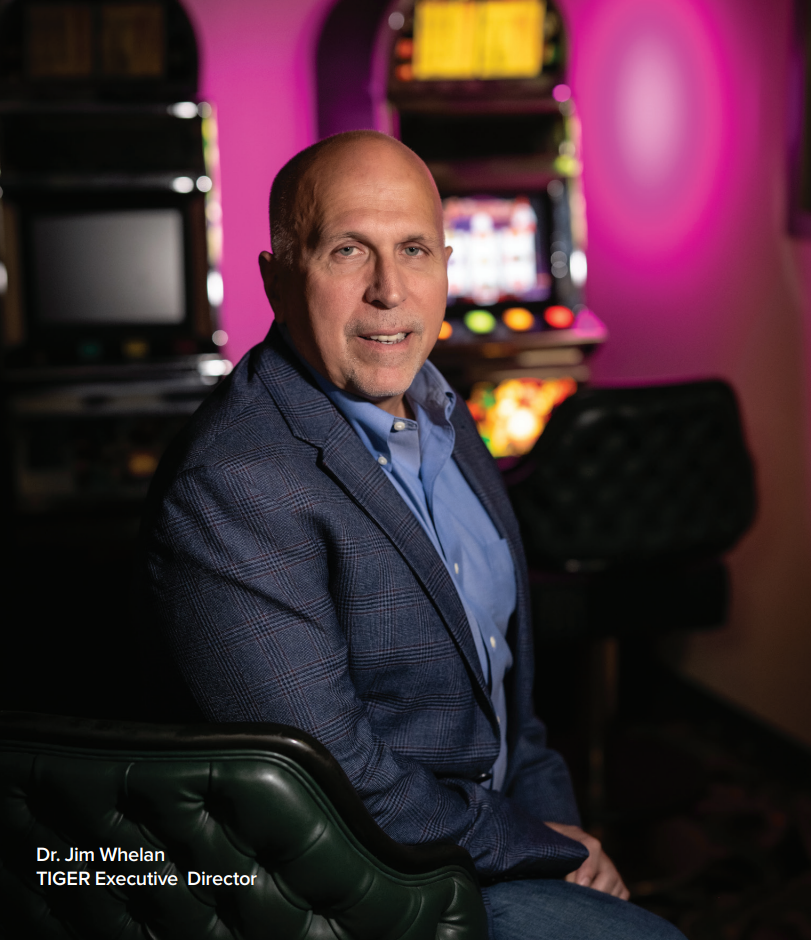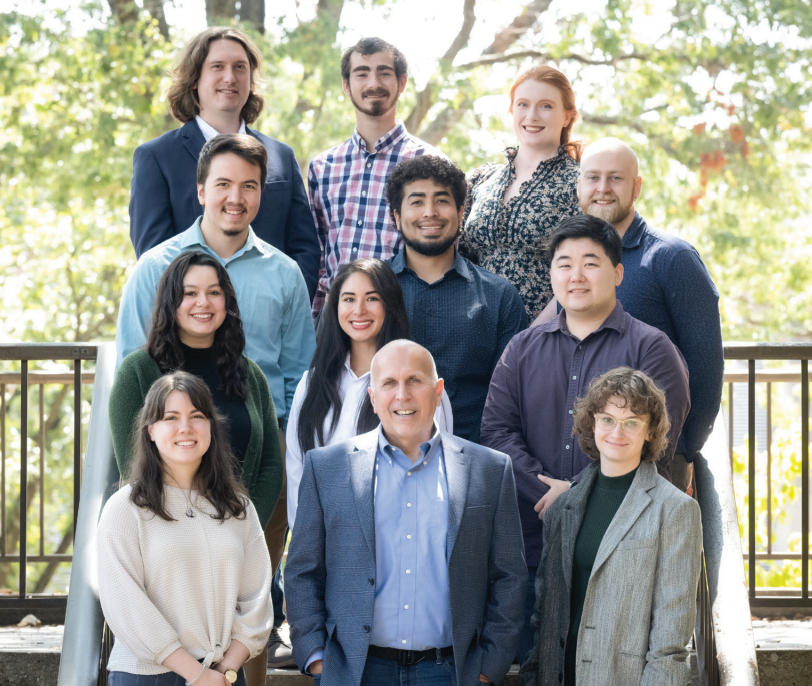Answering the Call
By Jeff Hulett

 Nowadays in Tennessee, placing a wager on a sporting event is as simple as downloading
an app, registering an account and making a bet from the comfort of your home, office
or really anywhere.
Nowadays in Tennessee, placing a wager on a sporting event is as simple as downloading
an app, registering an account and making a bet from the comfort of your home, office
or really anywhere.

The ease of accessibility has created booming business. The United States incurred nearly $53 billion in commercial gross gaming revenue in 2021. The Tennessee Education Lottery has grown to more than $2.08 billion in revenue. Another $2.73 billion was wagered in Tennessee on sports betting in 2021.
In some cases, that revenue comes at a harmful cost as the ease of accessibility greatly increases the potential for addiction. Creating resources to combat such harmful habits is the mission of the Tennessee Institute for Gambling Education & Research (TIGER) at the University of Memphis. Funded by the Tennessee Department of Mental Health and Substance Abuse Services, TIGER was formed more than two decades ago to assess and treat individuals dealing with issues caused by gambling.
 “Gambling has been constantly evolving for the last 25-30 years,” said Dr. Jim Whelan,
TIGER executive director. “In the 1990s when states began to legalize casinos across
the country, that’s when things really changed.”
“Gambling has been constantly evolving for the last 25-30 years,” said Dr. Jim Whelan,
TIGER executive director. “In the 1990s when states began to legalize casinos across
the country, that’s when things really changed.”
During that time, long trips to bigger cities turned into short drives to smaller municipalities as easy access to slot machines and table games increased. As accessibility grew, so did knowledge about the damage it could cause. At the time, funding through federal grants wasn’t there to support this work. Since then, Whelan and others have stepped up to lobby for support at the state level.
In 2005 when a lottery bill was up in Tennessee, Whelan saw an opportunity to pursue a safety net to evaluate and understand the harms of gambling. Fast forward to 2018 when the sports wagering bill passed, and Whelan again reached out for support. This time, legislators thoughtfully allocated 5% of revenue be distributed to the Department of Mental Health and Substance Abuse Services.
“They partnered with us because of our more than 15-year successful relationship with them, and we highly value their confidence in us to provide services statewide,” said Whelan, who was the 2022 International Center for Responsible Gaming Scientific Achievement Award recipient.
The latest funding for TIGER included opening an East Tennessee State University Clinic, overseen by Dr. Meredith Ginley. A longtime collaborator with TIGER, Ginley has expertise in addiction services in rural communities. Whelan, Ginley, Dr. Rory Pfund — all three UofM alumni — and the TIGER team work closely on creating sustainable and accessible systems for all Tennesseans experiencing harm due to gambling and gambling issues.
The group ranks in the top .25% of gambling researchers in the world. Their contributions are clearly significant to the whole of gambling research while also helping the UofM achieve and maintain its Carnegie R1 status as one of the top research institutions in the United States.
“Research has repeatedly shown that only one in 10 people with a gambling problem seek treatment and 40% of them discontinue before receiving an adequate therapeutic dose,” Whelan said. “Some come in depressed and that can exacerbate their gambling. If we can identify this type of thing, we can personalize treatment experiences.”
In 2023, 85% of TIGER clients were showing up to their appointments, an impressive figure Whelan says is the result of research conducted by his team into specific client needs and providing easy access to the clinic.
“The ideas that a person needs to hit rock bottom before they change or that they just need to be a more responsible person are myths,” Whelan said. “Gambling problems arise for a number of reasons.
The person suffering often struggles with being aware of what is really wrong and are lost about how to fix their life.”
That change process can be incredibly challenging, so providing a hospitable place for those seeking change is paramount for the clinic. The TIGER staff prides itself on meeting people where they are while creating an environment to bolster their motivation to make change and learn skills to make those changes stick. They also reinforce patients having appropriate expectations for themselves and the process.
As for what’s new at the clinic, Whelan is most excited about how their team of peer-recovery specialists can support clients. These specialists have lived experience with addiction or mental health issues. They have struggled through recovery and are trained to help others who are creating their own recovery path.
Whelan is a believer that for many people gambling can be an enjoyable stress reliever that is handled responsibly.
For roughly 4-7% of people, though, gambling can get out of control quickly. A person might find themselves chasing what they lost and become preoccupied with getting a chance
to bet again or use gambling excessively as a primary escape from day-to-day life.
For about 1-2%, gambling can effectively destroy their lives as they develop an inability to stop. They may even want to cut back, but they can’t seem to maintain that effort. They borrow and take risks to secure funds for their habit, sometimes at extreme costs.
 “We have learned that on average a person with a gambling disorder causes harm to
six other people,” Whelan said. “Translating these small percentages means that more
than 100,000 Tennesseans will likely experience a gambling disorder in their lifetime,
which means that 600,000 others will experience the burden of those harms. Fortunately,
therapy that specifically addresses the gambling can reduce those harms and significantly
improve a person’s life. We at TIGER are answering the call to help those in need.”
“We have learned that on average a person with a gambling disorder causes harm to
six other people,” Whelan said. “Translating these small percentages means that more
than 100,000 Tennesseans will likely experience a gambling disorder in their lifetime,
which means that 600,000 others will experience the burden of those harms. Fortunately,
therapy that specifically addresses the gambling can reduce those harms and significantly
improve a person’s life. We at TIGER are answering the call to help those in need.”
Top row, left to right: Dr. Rory Pfund, Clinic and Research Director; Mason Weiss, Undergraduate Research Assistant; Abby McPhail, Therapist and Doctoral Research Assistant
Second row from top, left to right: Chance Dow, Masters Research Assistant; Marcos Lerma, Therapist and Doctoral Research Assistant; Matthew Andersland, Therapist and Doctoral Research Assistant
Second row from bottom, left to right: Bre’Anna Free, Doctoral Research Assistant; Adrianna Valencia, Therapist and Doctoral Research Assistant; Ji wan Son, Master's Research Assistant
Bottom row, left to right: Esther Hudson, Systems Coordinator; Dr. Jim Whelan, Executive Director; Halle Smith, Master's Research Assistant
Share this article

